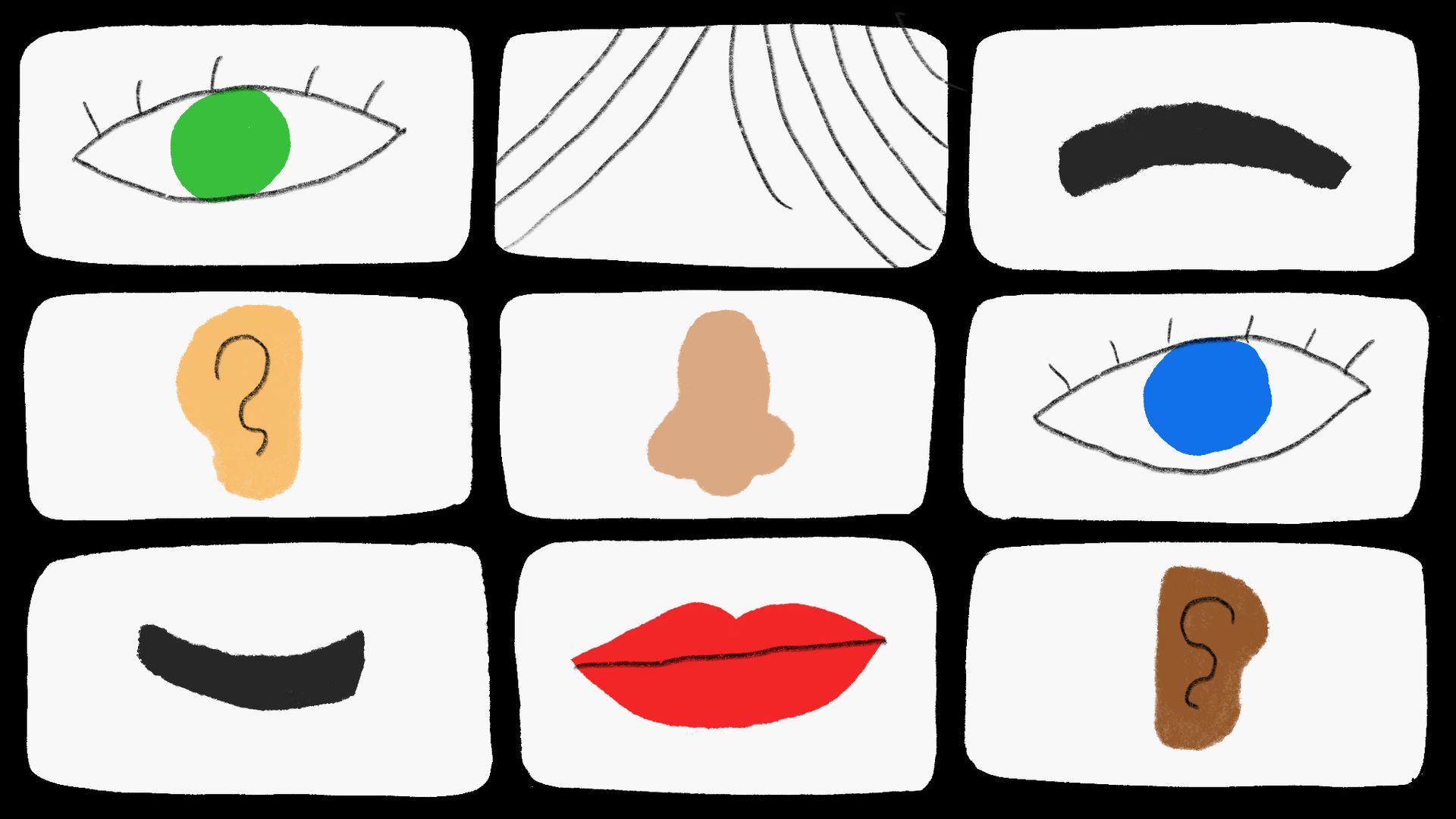尊敬的用戶您好,這是來自FT中文網的溫馨提示:如您對更多FT中文網的內容感興趣,請在蘋果應用商店或谷歌應用市場搜尋「FT中文網」,下載FT中文網的官方應用。

If you still find it hard not to stare at yourself when you’re on a video call, then you are not alone. Nor should you worry that this betrays a distressing level of narcissism. The author Nancy Mitford once observed that people who look at themselves in every reflection often do so not from vanity but a feeling that all is not quite as it should be. Video calls, which subtly distort our faces, are the perfect demonstration.
如果你在視訊通話時仍然發現自己無法不盯著自己看,那麼你並不孤單。你也不必擔心這暗示了一種令人不安的自戀程度。作家南希•米特福德(Nancy Mitford)曾經觀察到,那些在每個反射中都盯著自己看的人,往往並非出於虛榮,而是因爲有種感覺,即事情並不完全如預期。視訊通話微妙地扭曲了我們的面容,這就是最好的證明。
The speed with which we have folded video meetings into our lives is remarkable. In 2019, California video conferencing company Zoom had 10mn daily users. It now has about 300mn. Rapid uptake has resulted in new etiquette — the smile and silent wave that marks the end of a call, for example. But the level of self-surveillance that is required remains strange. This is why companies such as Microsoft, Google and Zoom have been quietly changing your appearance.
我們將視訊會議融入生活的速度之快令人驚歎。2019年,加利福尼亞的視訊會議公司Zoom的日均用戶數量爲1000萬。現在,這個數字已經成長到約3億。快速的普及帶來了新的禮儀——例如,微笑和無聲的揮手標誌着通話的結束。然而,所需的自我監控程度仍然讓人感到不尋常。這就是爲什麼微軟(Microsoft)、谷歌(Google)和Zoom等公司一直在悄悄地改變你的外觀。
Last year, Microsoft introduced an eye-catching feature that allowed videocall users to pick from 12 digital make-up “looks”. The effects, created in tandem with cosmetics brand Maybelline, make cheeks appear rosier and eyes brighter. There is always the risk that a slow internet connection will produce a lag — move fast and your lipliner may not move with you — but it is a remedy to feeling drab in a morning meeting.
去年,微軟推出了一項引人注目的功能,允許視訊通話用戶從12種數位化妝容中進行選擇。這些效果是與化妝品品牌美寶蓮聯手打造的,能讓臉頰更紅潤,眼睛更明亮。然而,網路連接速度慢可能會造成延遲——如果動作過快,你的脣線可能無法跟上你的移動——但這也是一種解決早晨會議中感覺平淡無光的良方。
Adding digital make-up to something that is primarily a work tool had a mixed response from users. Why, asked one, was Microsoft fiddling about with appearances when other features were still lacking? “There’s still no way for me to create a single Teams channel meeting in the Teams Calendar app,” they wrote. “ . . . but I can put on lipstick? How is this a priority?”
對於主要作爲工作工具的東西新增數位化化妝功能,用戶的反應褒貶不一。有人質疑,爲什麼微軟在其他功能尚未完善的情況下,卻在外觀上做文章?他們寫道:「我在'Teams'日曆應用中仍無法成立一個單獨的'Teams'頻道會議……但我可以塗口紅?這怎麼成爲優先事項了?」
In fact, how people look online is a priority for tech companies such as Microsoft. If that is someone’s main source of unease, then fixing it will help to ensure they keep using video conferencing platforms.
實際上,如何塑造人們在網上的形象是微軟等科技公司的首要任務。如果這是某人主要的不安之源,那麼解決這個問題將有助於保證他們繼續使用視訊會議平臺。
Perhaps you think you haven’t participated in this trend? If so, you’d be wrong. Not every change has been as dramatic as Microsoft’s make-up looks. Most are subtle and take place without your knowledge.
也許你認爲自己並未參與到這個趨勢中?如果是這樣,你就錯了。並非所有的變化都像微軟的數字妝容那樣引人注目。大部分變化都是微妙的,並且在你毫不知情的情況下發生。
Take mirror view, which means that the screen you now see in most video conferences shows the version of your face that you see in a mirror — ie the one that you are most familiar with. Looking at the other version, the one everyone else sees when they look at you, tends to be jarring. Any asymmetry seems to be the wrong way round and so stands out. It’s something that smartphone makers and selfie-focused social networking company Snap figured out a long time ago.
採用鏡像視圖,這意味著你在大多數視訊會議中看到的螢幕顯示的是你在鏡子中看到的自己的臉——也就是你最熟悉的那個版本。看向另一個版本,也就是其他人看你時所看到的版本,往往會讓人感到不適。任何不對稱的地方似乎都是反向的,因此顯得格外突出。這是智慧型手機製造商和以自拍爲主的社交網路公司Snap很早就發現的事實。
Other tweaks include lighting effects and skin smoothing. Zoom says that it was the first to offer “touch up my appearance” filters. In 2022, Microsoft introduced a soft-focus filter. A year later, Google added what it called “portrait touch-up”.
其他調整包括燈光效果和皮膚平滑處理。Zoom聲稱,它是第一個提供「美化我的外觀」濾鏡的公司。2022年,微軟推出了柔焦濾鏡。一年後,谷歌增加了被稱爲「人像修飾」的功能。
Blame computers rather than your face for these fixes. PCs and laptops tend to have small camera lenses and record users relatively close up. That distorts appearances. Prominent parts of the face stand out more. Eyes can look smaller.
這些問題應歸咎於電腦,而非你的臉部。個人電腦和筆記型電腦通常配備較小的攝影機鏡頭,且拍攝用戶的距離相對較近,這會導致外貌扭曲。臉部突出的部分會更加顯眼,眼睛可能看起來更小。
Seeing this slightly unusual, and unflattering, version of yourself may be behind the phenomenon dubbed Zoom dysmorphia, in which people fixate on the supposed flaws they see on screen. I asked a Bay Area cosmetic nurse if it was true that video meetings had led to a rise in customers seeking fillers, Botox and other invasive procedures. Not only had the numbers increased, she said, but some patients came to see her with screenshots of themselves from online meetings. This is backed up by a 2021 survey of US dermatologists who said most of their patients mentioned video calls as one of the reasons for pursuing cosmetic treatment.
看到螢幕上稍顯不尋常且不討人喜歡的自我形象,可能是被稱爲「Zoom失形症」的現象的背後原因,人們在這種現象中會過度關注他們在螢幕上看到的所謂的缺陷。我詢問了灣區的一位美容護士,視訊會議是否真的導致了尋求填充劑、肉毒桿菌和其他侵入性手術的顧客增加。她說,不僅人數增加了,而且一些患者還帶著自己在在線會議中的截圖來找她。這得到了2021年對美國皮膚科醫生進行的一項調查的支援,調查顯示,大多數患者都提到視訊通話是他們尋求美容治療的原因之一。
Of course, the simple answer is to stop looking at yourself — or turn off self-view and concentrate on everyone else. But despite the complaints about how uncomfortable it is to be confronted with your own face for hours on end, this is a relatively unpopular option. A journalist at online magazine Wired suggested that hiding your image might induce a feeling that you have “dissolved into the ether”. I think it may be more to do with a mood-lowering suspicion that you need to monitor yourself in case your face does something weird in the meeting.
當然,最簡單的解決辦法就是不再看自己——或者關閉自我視角,專注於其他人。但是,儘管有人抱怨連續幾個小時面對自己的臉有多不舒服,這個選擇相對來說並不受歡迎。在線雜誌《連線》的一位記者提出,隱藏自己的形象可能會讓人產生一種「消失在虛空中」的感覺。我認爲這可能更多的是因爲一種情緒低落的懷疑,你需要監控自己,以防你的臉在會議中做出奇怪的表情。
There is a final, rather drastic, remedy. Google’s AI model Gemini is planning a new feature called “Attend for me” in which it will turn up to a video meeting on your behalf, deliver your message and then send you a recap of the other attendees responses. It sounds fantastically impolite and the sort of feature that will lead to no one attending video meetings in person ever again. For those who dislike looking at themselves online, that would be the dream scenario.
還有一個最後的、相當激進的解決方案。谷歌的AI模型雙子座(Gemini)正在計劃推出一項名爲「代我出席」的新功能,它將代表你出席視訊會議,傳達你的資訊,然後向你發送其他與會者的反饋摘要。這聽起來非常不禮貌,而且這種功能可能會導致人們再也不親自參加視訊會議。對於那些不喜歡在網上看自己的人來說,這將是理想的場景。